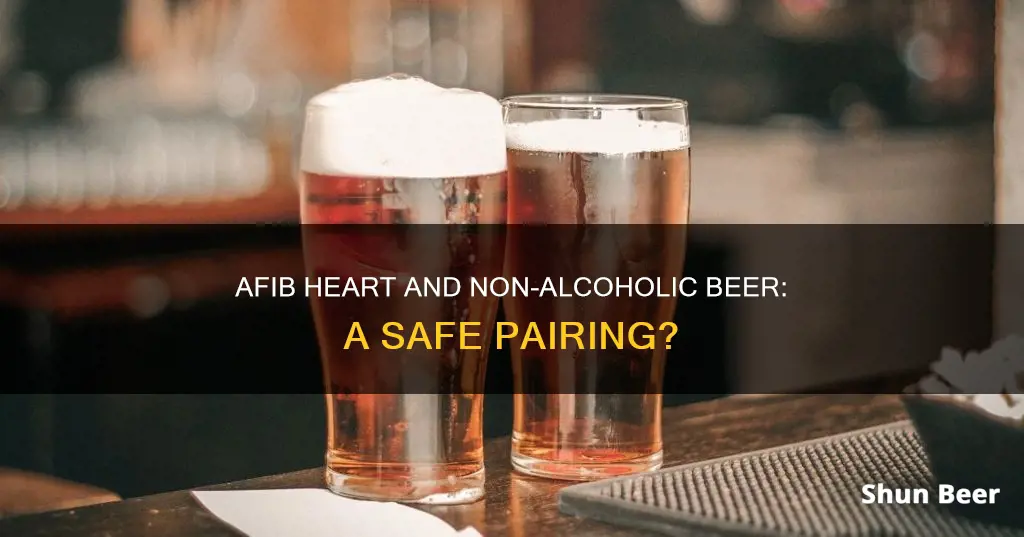
Drinking alcohol is known to increase the risk of atrial fibrillation (Afib), a condition that causes the heart to beat rapidly and out of rhythm, which can lead to blood clots, strokes, heart failure, and other heart conditions. While moderate drinking is generally considered to be okay for people without other risk factors, those with Afib need to be more cautious as even small amounts of alcohol can trigger symptoms such as heart palpitations. So, is non-alcoholic beer okay to drink if you have Afib? Non-alcoholic beer typically contains very low levels of alcohol, usually less than 0.5% ABV. For people with Afib, the key concern with alcohol consumption is whether it triggers their Afib symptoms. Therefore, while non-alcoholic beer may be a better option than regular beer for people with Afib, it is important to remember that even small amounts of alcohol can affect individuals differently. It is always best to consult with a doctor to determine what is safe and to consider other drinks that are completely alcohol-free.
| Characteristics | Values |
|---|---|
| Is non-alcoholic beer safe for people with AFib? | There is no clear evidence that non-alcoholic beer is harmful to people with AFib. However, it is recommended that people with AFib avoid alcohol as it can trigger symptoms and increase the risk of developing AFib. |
| Alcohol and AFib | Research suggests that alcohol can trigger AFib symptoms and increase the risk of developing AFib. Binge drinking and heavy drinking are particularly harmful and can lead to "Holiday Heart Syndrome". |
| Safe alcohol consumption for people with AFib | There is no definitive answer. Some sources suggest complete abstinence, while others recommend not exceeding moderate drinking limits (1 drink/day for women, 2 drinks/day for men). People with AFib should monitor their response to alcohol and avoid it if it triggers symptoms. |
What You'll Learn
- Binge drinking and heavy drinking are not recommended for people with Afib
- Alcohol can trigger symptoms of Afib, such as heart palpitations
- Drinking alcohol may increase the risk of developing Afib
- Moderate drinking may be okay for people with Afib, as long as it doesn't trigger symptoms
- Alcohol can increase the risk of bleeding if taken with blood thinners

Binge drinking and heavy drinking are not recommended for people with Afib
The combination of excessive alcohol consumption and Afib can be dangerous and even life-threatening. Alcohol can disrupt the heart's natural pacemaker, affecting its electrical signals and causing an irregular heartbeat. This can lead to serious health issues, including blood clots, strokes, heart failure, and other heart conditions. Additionally, alcohol can increase the risk of bleeding, especially for those taking blood thinners or drugs that reduce blood clotting.
The effects of alcohol on people with Afib can vary. Some individuals with Afib may be able to tolerate a drink or two without experiencing any negative consequences, while others may find that even a single drink triggers their Afib symptoms. It is important for people with Afib to monitor their alcohol intake and be aware of their personal limits. If alcohol triggers Afib symptoms, it is best to avoid it altogether.
Moderate drinking, defined as no more than one drink per day for women and no more than two drinks per day for men, may be acceptable for some people with Afib. However, it is crucial to consult with a doctor to understand individual risk factors and make informed decisions about alcohol consumption. The bottom line is that excessive alcohol consumption, whether through binge drinking or heavy drinking, is not recommended for people with Afib due to the potential risks and negative impact on heart health.
Ants and Beer: A Curious Relationship Explored
You may want to see also

Alcohol can trigger symptoms of Afib, such as heart palpitations
Research has found that even a single drink per day was linked to a 16% higher risk of developing Afib compared to not drinking at all. For people who already have Afib, a single drink doubles the odds of an Afib episode within the next four hours. The risk increases with the amount of alcohol consumed; among people having two or more drinks in one sitting, there was a more than threefold higher chance of experiencing Afib.
Binge drinking, defined as consuming more than five drinks in a row, also increases the likelihood of developing Afib. Doctors refer to this phenomenon as "holiday heart" because they see more cases of it around the holidays when people are more likely to overindulge in alcohol. However, it's important to note that even small amounts of alcohol can harm your heart.
If you have Afib and notice that alcohol triggers your symptoms, it's best to avoid it altogether. The general recommendation for daily alcohol consumption is no more than one standard drink per day for women and no more than two for men.
Drinking Beer in Public: Alameda's Rules and Regulations
You may want to see also

Drinking alcohol may increase the risk of developing Afib
Drinking alcohol is known to increase the risk of developing atrial fibrillation (Afib). Even a single drink per day has been linked to a higher risk of developing the condition. The more you drink, the more likely you are to be diagnosed with Afib.
The Link Between Alcohol and Afib
Research has found a strong link between alcohol consumption and the development of Afib. A study presented at the College of Cardiology's 70th Annual Scientific Session showed that a single alcoholic drink doubled a person's risk of having Afib within the next four hours. This risk tripled with two drinks.
Another study, published in the Journal of the American College of Cardiology, analysed data from 14 studies investigating the link between alcohol and Afib. The researchers concluded that avoiding alcohol completely is the best way to avoid the risk of Afib.
How Alcohol Affects the Heart
While experts are still unsure of the exact mechanism, there are several theories to explain how alcohol contributes to Afib. One theory involves the vagal nerve, which responds to alcohol, leading to increased nerve activity and potentially triggering an Afib event.
Alcohol can also affect fluid levels in the body, as it is a diuretic that causes the body to eliminate water. This can lead to dehydration, which can stress organs and deplete mineral levels, ultimately triggering Afib.
Guidelines for Afib Patients
The American Heart Association recommends that individuals who do not already drink alcohol should not start. For those who do drink, it is important to speak with a doctor to determine if it is safe to continue. Heavy drinking, defined as three or more drinks per day, significantly increases the risk of an Afib episode. Even moderate drinking can contribute to Afib, and experts recommend taking two to three alcohol-free days per week.
Alternative Options
If you are looking for alternatives to alcoholic beverages, there are several options to consider:
- Herbal teas: Offer a variety of flavours without the negative effects of alcohol.
- Water: Staying hydrated is important for maintaining healthy organ function.
- Sports drinks: Can help replenish fluids and minerals, but be mindful of the sugar content.
Beer and Acidity: Is There a Link?
You may want to see also

Moderate drinking may be okay for people with Afib, as long as it doesn't trigger symptoms
For people with atrial fibrillation (Afib), a condition that causes a rapid and irregular heartbeat, drinking alcohol can be a complex issue. On the one hand, research suggests that alcohol consumption, even in moderate amounts, can increase the risk of developing Afib and trigger symptoms in those who already have the condition. On the other hand, some people with Afib may find that they can tolerate a drink or two without experiencing any negative effects. So, what's the bottom line?
Moderate drinking may be okay for people with Afib as long as it doesn't trigger their symptoms. According to the Dietary Guidelines for Americans, moderate drinking is defined as no more than one drink per day for women and no more than two drinks per day for men. However, it's important to note that even this level of alcohol consumption can increase the risk of Afib. One study found that moderate drinking increased the risk of Afib by about 14% in people over 55 who had heart disease or diabetes.
The key factor in determining whether or not it's safe to drink with Afib is individual tolerance. For some people, even one drink is too much and can trigger symptoms like heart palpitations or an Afib episode. Others may find that they can tolerate a few drinks without any problems. It's important to note that drinking different types of alcohol may also affect people with Afib differently. For example, someone might be able to drink beer without issues but find that red wine triggers their Afib.
If you have Afib and choose to drink alcohol, it's crucial to do so in moderation and pay attention to your body's response. Additionally, staying well-hydrated by drinking water along with alcohol can help reduce the risk of Afib episodes. However, it's important to consult with your doctor about your individual risk factors and the safety of drinking alcohol with Afib, especially if you are taking blood thinners or other medications.
While moderate drinking may be okay for some people with Afib, it's important to remember that alcohol can have detrimental effects on heart health and overall well-being. Binge drinking, or consuming more than five drinks in a row, is particularly dangerous and can lead to "Holiday Heart Syndrome," where heavy drinking triggers Afib episodes. The more alcohol consumed, the higher the risk of heart-related issues. Therefore, it's crucial to weigh the risks and make informed decisions about alcohol consumption, especially for those with Afib.
Beer Before Liquor: Does Order Impact Your Hangover?
You may want to see also

Alcohol can increase the risk of bleeding if taken with blood thinners
Drinking alcohol while taking blood thinners can be dangerous, as it increases the risk of bleeding. This is because alcohol can disrupt the normal blood coagulation process, which is critical for preventing excessive bleeding and healing wounds. When combined with blood-thinning medications, alcohol can enhance their effects, leading to a greater risk of bleeding.
The combination of alcohol and blood thinners can alter the body's ability to form clots, which can be life-threatening in the event of an injury or accident. This is especially true for individuals with underlying liver conditions, as the liver is crucial for metabolizing both substances. Heavy or regular alcohol consumption while on blood thinners may lead to internal bleeding due to their synergistic blood-thinning effects.
While moderate alcohol consumption may be considered safe for some individuals taking blood thinners, it is generally recommended that those on anticoagulant therapy minimise their alcohol intake to avoid potential health complications. It is important for patients to consult their healthcare provider to understand the risks and establish safe drinking guidelines.
Additionally, alcohol consumption can have detrimental effects on liver function, leading to conditions such as liver disease and cirrhosis. The liver's ability to process alcohol diminishes with increased consumption, increasing the risk of liver damage. According to the National Institute on Alcohol Abuse and Alcoholism (NIAAA), a significant percentage of liver disease deaths are alcohol-related. Therefore, it is essential to consider the potential impact on liver function when consuming alcohol while taking blood thinners.
In summary, alcohol can increase the risk of bleeding when taken with blood thinners due to its impact on the blood coagulation process and liver function. Patients taking blood thinners should consult their healthcare provider to understand their individual risks and establish safe drinking guidelines.
Beer and Fever: Is There a Link?
You may want to see also
Frequently asked questions
Even though non-alcoholic beer doesn't contain alcohol, it often contains high levels of sodium, which can increase the risk of AFib. Therefore, it is best to consume non-alcoholic beer in moderation.
AFib, or atrial fibrillation, is a condition that causes the heart to beat really fast and out of rhythm. It can lead to blood clots, strokes, heart failure, and other heart conditions.
Alcohol can trigger AFib symptoms such as heart palpitations. It disrupts the heart's natural pacemaker, which is responsible for keeping the heart beating at the right pace.







